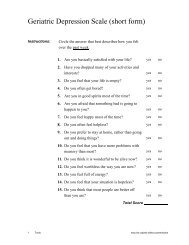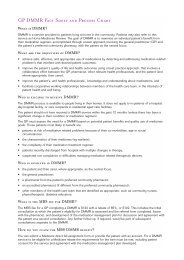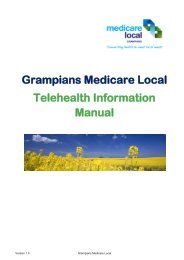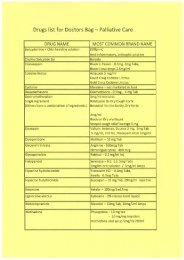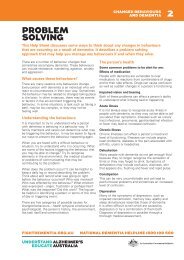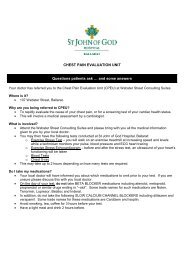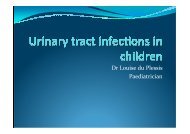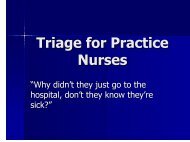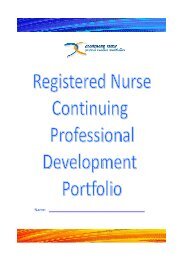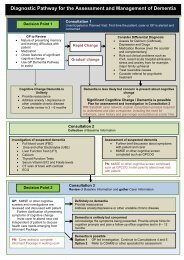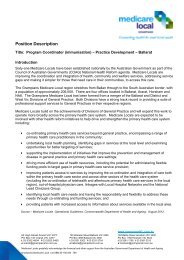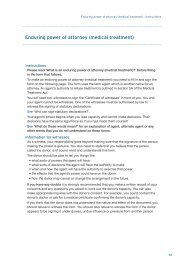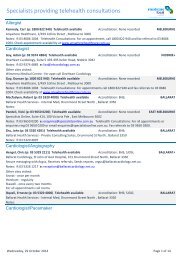Cental Goldfields - Grampians Medicare Local
Cental Goldfields - Grampians Medicare Local
Cental Goldfields - Grampians Medicare Local
You also want an ePaper? Increase the reach of your titles
YUMPU automatically turns print PDFs into web optimized ePapers that Google loves.
consultation fee, in contrast with presentations at the UCC, which are bulk-billed. This provides no<br />
incentive for patients to go to the usual clinics.<br />
CMC do not provide home visits, but NC will for special circumstances, although this is discouraged. GPs<br />
believe that patients who are too sick to get out of bed should be in hospital, and also that it takes a lot of<br />
time to see someone in their home, due to travel.<br />
Both practices report a heavy after hours workload for their GPs. On average, the on-call GP will see 10 to<br />
12 patients on a weeknight, Saturdays 15-20, Sundays 10-20 at the morning clinic, plus another 10 later in<br />
the day. The GP is also required to do ward rounds for the inpatients. One GP estimated that 60-70% of<br />
after hours calls were more for convenient care. There are 7 GPs on the after hours roster, but only 3 GPs<br />
can do obstetrics and anaesthetics. These 3 GPs are also senior clinicians and are required to be available<br />
to supervise or attend if a Registrar is on call and requires assistance or advice. Due to the day time<br />
practice workloads, these GPs may not get any time off after being on-call overnight – a significant issue if<br />
it has been a busy night. At interview, one practice manager reported that a GP had consulted all day and<br />
then had been so busy overnight that he had only had 2 hours sleep. He had a fully booked consulting day<br />
the next morning. The manager had no choice but to cancel all the morning appointments due to the risk<br />
of the GP seeing patients when exhausted.<br />
When asked to identify the key issues in after hours, one manager believed that during the sociable hours<br />
the demand was too high and in the unsociable hours there was frustration at inappropriate use by the<br />
community. This manager felt that the remuneration for after hours work did not offset the stressors on<br />
the GP providing that service, and the current demand made it difficult to recruit and retain GPs:<br />
“The after hours demand of country GPs is excessive and makes the task of recruiting doctors to our town<br />
extremely difficult.”<br />
One GP commented that many after hours phone calls in the unsociable periods were from isolated frail<br />
elderly patients living independently in the community.<br />
Remuneration for after hours services is a particular issue for Maryborough GPs. The retainer for being<br />
on-call to RACF is minimal. A great deal of work is telephone calls from patients, health services and<br />
RACFs – all of which attracts no payment. One GP estimated that he earns $14 per hour for a 24 hour oncall<br />
period.<br />
These GPs feel they are providing the same level of practice as an Emergency Department salaried doctor<br />
without the associated remuneration. There has previously been a co-payment model at the UCC, but this<br />
no longer exists, mainly due to the high number of bad debtors, and the fact that the usual clients<br />
presenting to the UCC are those that get bulk-billed anyway. The GPs are hoping that MDHS implements a<br />
facility fee payment for non-urgent after hours, so the onus no longer lies with the GPs, or the practice.<br />
The GPs see this as the only way to discourage people turning up for convenient versus urgent care.<br />
After Hours Practice Incentive Payments (PIP) are viewed by Maryborough GPs as inequitable across the<br />
region, as Ballarat GPs have access to two Emergency Departments.<br />
Maryborough GPs trialled an extended hours clinic based at MDHS over a period of years under grant<br />
funding. The decision was made to discontinue this clinic due to the majority of the presentations being<br />
convenient care, not urgent care. There was no discernible impact on daytime demand nor presentations<br />
to the UCC.<br />
Page | 10




